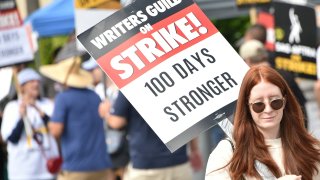
- Writers and producers are near an agreement to end the Writers Guild of America strike after meeting face-to-face on Wednesday, people close to the negotiations told CNBC.
- The two sides met and hope to finalize a deal Thursday, the sources said. While optimistic, the people noted, however, that if a deal is not reached the strike could last through the end of the year.
- On Wednesday evening, the WGA and the Alliance of Motion Picture and Television Producers released a joint statement that the two groups met for bargaining and would meet again Thursday.
Writers and producers are near an agreement to end the Writers Guild of America strike after meeting face-to-face on Wednesday, people close to the negotiations told CNBC's David Faber on Wednesday.
The two sides met and hope to finalize a deal Thursday, the sources said. While optimistic, the people told Faber, however, that if a deal is not reached the strike could last through the end of the year.
Get top local stories in Southern California delivered to you every morning. Sign up for NBC LA's News Headlines newsletter.
On Wednesday evening, the WGA and the Alliance of Motion Picture and Television Producers released a joint statement that the two groups met for bargaining and would negotiate again on Thursday. The sides are set to reconvene at 9 a.m. PT on Thursday, Faber reported. Representatives for the organizations didn't respond to requests for further comment.
WGA members have been on strike for more than 100 days — with actors joining the picket line in July — leaving Hollywood production of TV shows and movies at a standstill. Production has been halted for several high-profile shows and films, including Netflix's "Stranger Things," Disney and Marvel's "Blade," and Paramount's "Evil."
Earlier in the week, the writers' union said it would resume negotiations with the studios.
Money Report
This appears to be the closest the two sides have come to a resolution since the more than 11,000 film and TV writers went on strike beginning May 2. They have argued their compensation doesn't match the revenue that's been generated during the streaming era.
Beyond higher compensation, the WGA has been pushing for new rules that would require studios to staff TV shows with a certain number of writers for a certain period. The writers are also seeking compensation throughout the process of preproduction, production and postproduction. As of now, writers are often expected to provide revisions or come up with new material without being paid.
In late August, the AMPTP went public with its latest proposal to the WGA at the time and tensions between the two groups appeared to remain high.
Discussions between the studios and writers have included sit-down conversations with top media brass, including Warner Bros. Discovery CEO David Zaslav, Disney's Bob Iger, Netflix co-CEO Ted Sarandos and NBCUniversal film head Donna Langley.
The strikes have weighed on these media companies as they grapple with making streaming profitable and getting people back in theaters.
Warner Bros. Discovery — the owner of a TV and film studio, as well as the largest portfolio of pay TV networks — warned investors of the effects of the strikes earlier this month when it adjusted its earnings expectations. The company said it now expects that its adjusted earnings before interest, taxes, depreciation and amortization will take a hit of $300 million to $500 million, with a full-year range of $10.5 billion to $11 billion.
At a conference earlier this month, Zaslav called for an end to the writers and actors strikes.
"We need to do everything we can to get people back to work," Zaslav said at the investors' conference. "We really have to focus as an industry, and we are, on trying to get this resolved in a way that's really fair."
Disclosure: Comcast is the parent company of NBCUniversal and CNBC. NBCUniversal is a member of the Alliance of Motion Picture and Television Producers.






